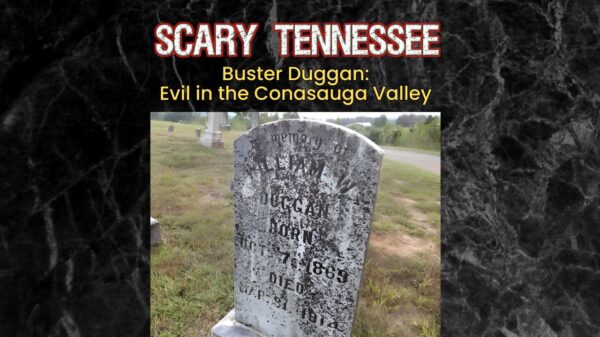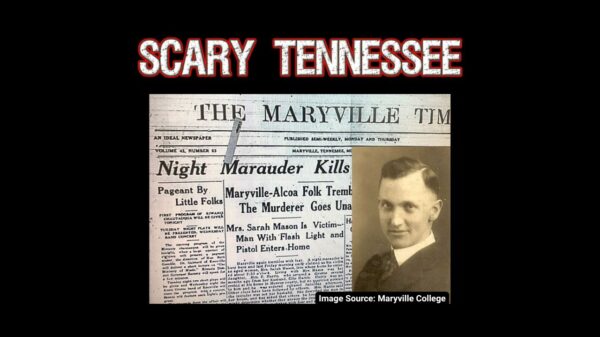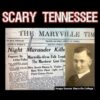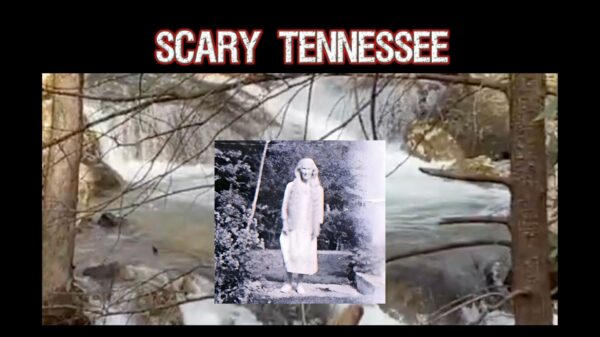Introduction: My grandmother, Leona Green, loved sharing stories, tall tales, history, and folklore from the Mountains of Tennessee, where she grew up. Whenever we visited her, she would captivate us with her storytelling. She was a master at spinning tales. Below is one of my favorites, based on a true story. –JC Bowman
In a quiet home nestled in the Tennessee hills, about four miles from the sleepy town of Tellico Plains, a horror was about to unfold on a fateful Friday night.
The Shaws—Jasper and his wife, both in their sixties, along with their close friend Matt Hensley—were tragically slain in a violent act of betrayal. The community, once peaceful and trusting, now turned its anxious gaze toward Bill Lee, a 23-year-old man with fair hair, a complexion as pale as winter’s moon, and piercing blue eyes that seemed to carry the weight of unspoken secrets. He was charged with the shocking triple homicide and robbery that shattered the community.
Bill Lee was no stranger to the Shaws; he was their own grandson, having returned to the area after years spent wandering elsewhere. Whispers through the town hinted at other crimes he had committed in different states.
Just the day before the bloodshed, he had ventured into the woods, hunting rabbits with another grandson, casually probing the family’s finances, learning of a trunk that held their savings—a detail that would prove fateful. That Saturday, Hensley had planned to assist the Shaws with planting potatoes, happily accepting their invitation to stay the night —a decision that would seal his tragic fate.
The only soul spared from the chaos of that night was a young boy, a grandson of the Shaws, who would later recount the chilling events that unfolded.
He shared a cramped room with his grandparents and Hensley, their beds separated by the thin veil of night. As the clock inched toward 9 p.m., a heated argument erupted. Lee demanded money from Mr. Shaw, who, in a moment of brave defiance, resisted.
In an explosive surge of rage, Lee overpowered his grandfather, knocking him to the floor before pulling the trigger of an automatic shotgun, the sound echoing through the stillness like a thunderclap.
The shot startled Hensley from his slumber, but before he could fully grasp the horror unfolding, Lee shot him dead, his life extinguished in an instant.
By this time, Mrs. Shaw had roused from her sleep, only to be met with the assault of a bullet that struck her shoulder. In a frenzy, Lee fired again, and when she remained alive, he unleashed a brutal attack, bludgeoning his grandmother to death.
The young boy, trembling with fear, rolled underneath the bed. As Lee looked in the mirror, he saw his cousin. Lee forced him to cower beneath the bed, a chilling threat hanging in the air—that his own life would be taken if he dared to emerge before the sun rose the next day.
After the grisly acts had been committed, Lee took sinister steps to erase his tracks. He draped bedding over the windows, barricaded the doors, and rifled through the trunk, pilfering whatever money he could find. With the Shaws’ Plymouth car, he vanished into the night, leaving behind a home stained with sorrow.
Once the sound of the car faded into the distance, the boy summoned the courage to emerge from his hiding place, racing to alert his uncle to the unspeakable tragedy that had just unfolded. The precise amount stolen from the Shaws remained cloaked in mystery, though it was rumored to be a substantial sum.
Days later, Bill Lee was captured in a dramatic twist of fate that began with a search sparked by Vigilant citizens. Sheriff Hugh Webster coordinated a quick response, blocking roads in every direction to prevent his escape.
In Murphy, North Carolina, approximately 25 miles away, deputies learned of Lee’s flight and hastily erected a roadblock. When they spotted his vehicle, they shot out its tires, sending it careening down a 40-foot embankment and into a creek.
When officers arrived, they discovered Lee, dressed in women’s clothing, attempting to swim downstream, accompanied by two young men, Frank Bobo and Troy Brown, both in their twenties. They all quickly surrendered.
Lee admitted his identity and waived extradition, while officers discovered a sawed-off shotgun, a pistol, and ammunition in his vehicle. He later claimed that the family had been drinking, and the situation had spiraled into chaos.
In a bewildering defense, Lee argued he had acted in self-defense, insisting that his grandfather had attacked Mrs. Shaw with the assistance of Hensley. After snatching a mere $23 from his grandfather’s pockets, he fled, terrified of the community’s retribution.
He confessed to stealing a car from a salesperson in Kentucky at gunpoint, a detail that added to the mounting evidence against him. As the investigation deepened, the sheriff announced that Lee’s companions would face charges for aiding a felon, with authorities in Kentucky also keen to pursue them for the stolen vehicle.
The following Monday marked Lee’s first appearance in court, where the date for his trial was set for the murders of his grandparents and Hensley. Indicted on three counts, he was assigned a court-appointed attorney, Frank Bratten. Reports surfaced that Lee had confessed to the murders, further complicating his defense.
As the trial unfolded, it culminated in closing arguments on a Saturday. After merely an hour of deliberation, the jury returned with a verdict of first-degree murder. Judge Blair pronounced the sentence: death by electric chair.
Throughout the proceedings, Lee maintained an eerie composure, betraying little emotion even when the sentence was delivered. Upon returning to his cell, he casually informed fellow inmates that the judge had awarded him a medal.
One of the most poignant testimonies came from 13-year-old Howard Shaw, who described the horror from his refuge beneath the bed—how his grandfather was shot first, followed by Hensley, and finally, his grandmother was beaten to death.
Howard recalled Lee’s visit to the Shaw home when he had inquired about the family’s money. It was merely a precursor to the violence that was about to unfold.
W.O. Shaw, another family member, testified to a conversation he had with Lee the day before the murders, in which Lee brazenly stated he knew an older man with plenty of money and intended to claim it. The only defense witness, Lee himself, claimed he had gone to the Shaw home seeking work, insisting the tragic events had spiraled out of control due to a family altercation.
After the trial, Judge Blair swiftly denied a motion for a new trial, granting the defense 20 days to appeal to the Supreme Court. Following the verdict, Lee was transferred from the Monroe County Jail to the state penitentiary in Nashville for his safety.
His execution date was set for June 14, though he was afforded 30 days to appeal. Ultimately, the Supreme Court upheld the lower court’s judgment, designating January 21 as the execution date for Lee and three others facing the ultimate penalty.
The tragic saga of Bill Lee and the doomed Shaw family would haunt the collective memory of the community. This story was a tale etched in the annals of the community’s history. Even today, it reverberates in the hearts of those left behind.
JC Bowman is the Executive Director of Professional Educators of Tennessee and the Contributing Editor of TriStar Daily.
















